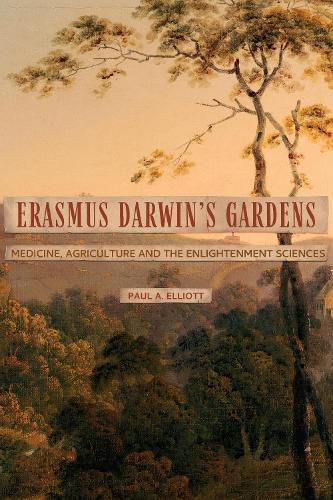Readings Newsletter
Become a Readings Member to make your shopping experience even easier.
Sign in or sign up for free!
You’re not far away from qualifying for FREE standard shipping within Australia
You’ve qualified for FREE standard shipping within Australia
The cart is loading…






This first full study of Erasmus Darwin's gardening, horticulture and agriculture shows he was as keen a nature enthusiast as his grandson Charles, and demonstrates the ways in which his landscape experiences transformed his understanding of nature.
Famous as the author of the Botanic Garden (1791) and grandfather of Charles Darwin (1809-1882), Erasmus Darwin (1731-1802) was a larger-than-life enlightenment natural philosopher (scientist) and writer who practised as a doctor across the English Midlands for nearly half a century. A practical gardener and horticulturist, Darwin created a botanic garden near Lichfield - which galvanised his poetry - and kept other gardens, an orchard and small "farm" in Derby. Informed by his medical practice and botanical studies, Darwin saw many parallels between animals, plants and humans which aroused hostility during the years of revolution, warfare and reaction, but helped him to write Zoonomia (1794/96) and Phytologia (1800) - his major studies of medicine, agriculture and gardening. Captivated by the changing landscapes and environments of town and country and supported by social networks such as those in Lichfield and Derby, Darwin avidly exchanged ideas about plants, animals and their diseases with family, patients, friends such as the poet Anna Seward (1742-1809), farmers, fellow doctors, huntsmen and even the local mole catcher.
This is the first full study of Erasmus Darwin's gardening, horticulture and agriculture. It shows him as keen a nature enthusiast as his contemporary Rev. Gilbert White of Selbourne (1720-1793) or his grandson Charles, fascinated with everything from swarming insects and warring bees to domestic birds and dogs, pigs and livestock on his farm to fungi growing from horse dung in Derby tan yards. Ranging over his observations of plant physiology and anatomy to the use of plant "bandages" in his orchard and electrical machines to hasten seed germination to explosive studies of vegetable "brains", nerves and sensations, the book demonstrates the ways in which Erasmus Darwin's landscape and garden experiences transformed his understanding of nature. They provided him with insights into medicine and the environmental causes of diseases, the classification of plants and animals, chemistry, evolution, potential new medicines and foodstuffs and the ecological interdependency of the natural economy. Like the amorous vegetables of the Loves of the Plants (1789) which fascinated, scandalised and titillated late Georgian society, the many living creatures of Darwin's gardens and farm encountered in this book were for him real, dynamic, interacting and evolving beings who helped inspire and re-affirm his progressive social and political outlook.
$9.00 standard shipping within Australia
FREE standard shipping within Australia for orders over $100.00
Express & International shipping calculated at checkout
This first full study of Erasmus Darwin's gardening, horticulture and agriculture shows he was as keen a nature enthusiast as his grandson Charles, and demonstrates the ways in which his landscape experiences transformed his understanding of nature.
Famous as the author of the Botanic Garden (1791) and grandfather of Charles Darwin (1809-1882), Erasmus Darwin (1731-1802) was a larger-than-life enlightenment natural philosopher (scientist) and writer who practised as a doctor across the English Midlands for nearly half a century. A practical gardener and horticulturist, Darwin created a botanic garden near Lichfield - which galvanised his poetry - and kept other gardens, an orchard and small "farm" in Derby. Informed by his medical practice and botanical studies, Darwin saw many parallels between animals, plants and humans which aroused hostility during the years of revolution, warfare and reaction, but helped him to write Zoonomia (1794/96) and Phytologia (1800) - his major studies of medicine, agriculture and gardening. Captivated by the changing landscapes and environments of town and country and supported by social networks such as those in Lichfield and Derby, Darwin avidly exchanged ideas about plants, animals and their diseases with family, patients, friends such as the poet Anna Seward (1742-1809), farmers, fellow doctors, huntsmen and even the local mole catcher.
This is the first full study of Erasmus Darwin's gardening, horticulture and agriculture. It shows him as keen a nature enthusiast as his contemporary Rev. Gilbert White of Selbourne (1720-1793) or his grandson Charles, fascinated with everything from swarming insects and warring bees to domestic birds and dogs, pigs and livestock on his farm to fungi growing from horse dung in Derby tan yards. Ranging over his observations of plant physiology and anatomy to the use of plant "bandages" in his orchard and electrical machines to hasten seed germination to explosive studies of vegetable "brains", nerves and sensations, the book demonstrates the ways in which Erasmus Darwin's landscape and garden experiences transformed his understanding of nature. They provided him with insights into medicine and the environmental causes of diseases, the classification of plants and animals, chemistry, evolution, potential new medicines and foodstuffs and the ecological interdependency of the natural economy. Like the amorous vegetables of the Loves of the Plants (1789) which fascinated, scandalised and titillated late Georgian society, the many living creatures of Darwin's gardens and farm encountered in this book were for him real, dynamic, interacting and evolving beings who helped inspire and re-affirm his progressive social and political outlook.